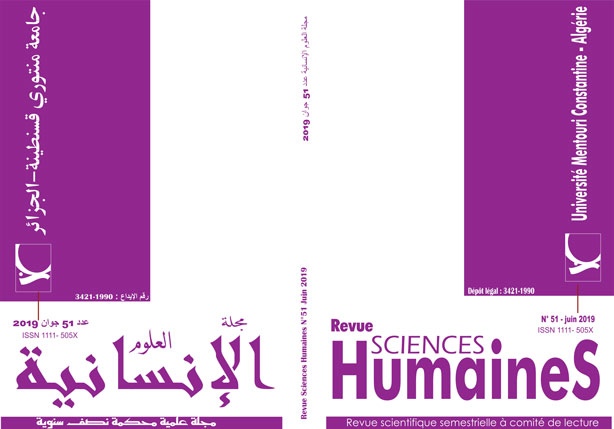LE TOURISME DURABLE : QELLES PERSPECTIVES AU SAHARA ALGERIEN ?
Keywords:
Tourisme, Développement Economique, Algérie, Tourisme Durable, PatrimoineAbstract
Avec plus d’un milliard de touristes qui sillonnent le monde chaque année, le tourisme est devenu un secteur à fort potentiel de croissance et de développement économique. Il est prisé par de nombreux pays qu’ils soient développés ou en cours de développement, et constitue pour eux un moyen indéniable de diversification économique. Cependant, comme tout secteur économique, le tourisme a des impacts négatifs sur l’environnement naturel, culturel et social des populations locales. Dans ce contexte, l’Algérie grâce à ces atouts touristiques et à son Sahara, plein d’histoire et riche en patrimoine naturel, culturel et social, peut devenir une destination touristique incontournable. Il faudra néanmoins, que ce développement soit basé sur les principes du tourisme durable, afin de conserver ses richesses inestimables et assurer un développement durableDownloads
References
Ayadi, R., Dabrowski, M., & De Wulf, L. (2015). Economic and Social Development of the Southern and Eastern Mediterranean Countries. Switzerland: Springer International Publishing.
Blake, G., & Lawless, R. I. (1972). Tourisme international au Sahara Algérien. Méditerranée, 11(3), 171-176.
Bramwell, B., & Lane, B. (1993). Sustainable tourism: An evolving global approach. Journal of Sustainable tourism, 1(1), 1-5.
Burns, P. M., & Novelli, M. (2006). Tourism ans social identities. Routledge.
Gossling, S., Hall, C. M., & Weaver, D. B. (2009). Sustainable Tourism Futures: Perspectives on systems, restructuring and innovations. Sustainable tourism futures, 21-36.
Gray, M. (2000). The Political Economy of Tourism in North Africa: Comparative Perspectives. Thunderbird International Business Review, 42(4), 393-408.
Hadach, M., & Tebbaa, O. (2015). Les partenariats entre les acteurs de tourisme pour la mise en place de durabilité, le cas de la région Marrakech Tensuft Alhaouz, au Maroc. La Revue Gestion et Organisation, 7(2), 69-76.
Hosni, E. (2000). Strategy for sustainable tourism development in the Sahara. (U. N. Organization, Ed.) Paris, France.
HuffPostMaghreb. (2016, Novembre). Récupéré sur huffpostmaghreb: https://www.huffpostmaghreb.com/2016/11/16/le-ksar-tafilelt-de-beni-isguen-obtient-le-1er-prix-de-ville-durable_n_13005898.html.
Jucan, C. N., & Jucan, M. S. (2013). Travel and Tourism as a Driver of Economic Recovery. Procedia Econoics and Finance, 6, 81-88.
Lee, J. W., & Brahmasrene, T. (2013). Investigating the influence of tourism on economic growth and carbon emissions: Evidence from panel analysis of the European Union. Tourism Management, 38, 69-76.
Schubert, S. F., Brida, J. G., & Risso, W. A. (2011). The impacts of international tourism demand on economic growth of small economies dependent on tourism. Tourism Management, 32(2), 377-385.
Theobald, W. F. (2012). Global tourism. Routledge.
Tolba, M. K. (1992). Saving Our Planet: Challenges and Hopes. Springer Science & Business Media.
UNWTO. (2011). Tourism towards 2030: Global Overview.
UNWTO. (2013). Guide du Tourisme Durable pour le Développement.
UNWTO. (2017). Tourism Highlights.
Weaver, D. B. (2006). Sutainable tourism: Theory and practice. Routledge.
WTTC. (2018). Travel & Tourism Economic Impact World.
WTTC. (2018). Travel and Tourism Economic Impact Algeria.












